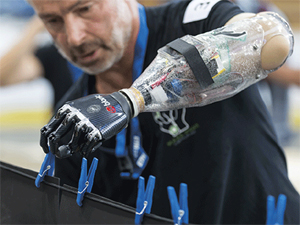



Date:10/10/16
 The world's first Cybathlon Championship for Athletes with Disabilities organised by the Swiss Federal Institute of Technology ETH Zurich debuted on Saturday at the SWISS Arena in Kloten, canton Zurich.
The world's first Cybathlon Championship for Athletes with Disabilities organised by the Swiss Federal Institute of Technology ETH Zurich debuted on Saturday at the SWISS Arena in Kloten, canton Zurich.
Popularly known as 'Bionic olympics', it differs from the paralympics as it sees participants compete against each other using the latest assistive technologies in terms of their ability to help users navigate the tasks and challenges of daily life. About 4,600 visitors attended the sold-out event that saw participation from seventy-two teams from 25 countries.
"People with a physical disability that restricts daily life – these are the real winners of the Cybathlon. And as we have seen today, great things can be achieved when their needs directly influence the development of new assistive technology," Robert Riener, Cybathlon initiator and ETH Zurich professor for sensory-motor systems, was quoted saying in a statement issued by the institute on Saturday evening.
The Cybathlon has six major events or disciplines, each highlighting a particular assistive technology. For each of these disciplines, winning teams will be given two medals: one for the pilot or athlete sporting the device and another for the device provider. The six major events are:
- The Brain Computer Interface (BCI) Race, which uses a video game for pilots with severe loss of motor function.
- The Functional Electrical Stimulation (FES) Bike Race, featuring pilots with spinal cord injuries and their non-motorized FES bikes.
- The Powered Arm Prosthesis Race, where pilots who've lost one or both arms complete challenges designed to mimic everyday tasks.
- The Power Leg Prosthesis Race, for pilots with transfemoral or knee ex-articulation amputation wearing so-called "active" prostheses, which allow for more accurate movement control.
- The Powered Exoskeleton Race, an obstacle course of typical everyday tasks for pilots with complete paraplegia wearing motorized supports (orthoses).
- The Powered Wheelchair Race, where pilots on motorized wheelchairs compete on parallel tracks to complete a series of obstacles.
The Cybathlon programme also included a scientific symposium and round table discussion for specialists in bionic prosthesis research on Thursday, as well as a programme for school-age students on Friday. A second event is already being planned for 2020.
World's first Cybathlon Championship for Athletes with Disabilities aka Bionic Olympics held in Switzerland
 The world's first Cybathlon Championship for Athletes with Disabilities organised by the Swiss Federal Institute of Technology ETH Zurich debuted on Saturday at the SWISS Arena in Kloten, canton Zurich.
The world's first Cybathlon Championship for Athletes with Disabilities organised by the Swiss Federal Institute of Technology ETH Zurich debuted on Saturday at the SWISS Arena in Kloten, canton Zurich.Popularly known as 'Bionic olympics', it differs from the paralympics as it sees participants compete against each other using the latest assistive technologies in terms of their ability to help users navigate the tasks and challenges of daily life. About 4,600 visitors attended the sold-out event that saw participation from seventy-two teams from 25 countries.
"People with a physical disability that restricts daily life – these are the real winners of the Cybathlon. And as we have seen today, great things can be achieved when their needs directly influence the development of new assistive technology," Robert Riener, Cybathlon initiator and ETH Zurich professor for sensory-motor systems, was quoted saying in a statement issued by the institute on Saturday evening.
The Cybathlon has six major events or disciplines, each highlighting a particular assistive technology. For each of these disciplines, winning teams will be given two medals: one for the pilot or athlete sporting the device and another for the device provider. The six major events are:
- The Brain Computer Interface (BCI) Race, which uses a video game for pilots with severe loss of motor function.
- The Functional Electrical Stimulation (FES) Bike Race, featuring pilots with spinal cord injuries and their non-motorized FES bikes.
- The Powered Arm Prosthesis Race, where pilots who've lost one or both arms complete challenges designed to mimic everyday tasks.
- The Power Leg Prosthesis Race, for pilots with transfemoral or knee ex-articulation amputation wearing so-called "active" prostheses, which allow for more accurate movement control.
- The Powered Exoskeleton Race, an obstacle course of typical everyday tasks for pilots with complete paraplegia wearing motorized supports (orthoses).
- The Powered Wheelchair Race, where pilots on motorized wheelchairs compete on parallel tracks to complete a series of obstacles.
The Cybathlon programme also included a scientific symposium and round table discussion for specialists in bionic prosthesis research on Thursday, as well as a programme for school-age students on Friday. A second event is already being planned for 2020.
Views: 628
©ictnews.az. All rights reserved.Similar news
- Azerbaijani project to monitor disease via mobile phones
- Innovative educational system to be improved under presidential decree
- NTRC prolongs license of two TV and radio organizations for 6 years
- Azerbaijan establishes e-registry for medicines
- Azerbaijani museum introduces e-guide
- Nar Mobile opens “Nar Dunyasi” sales and service center in Siyazan city
- International conference on custom electronic services held in Baku
- OIC secretary general to attend COMSTECH meeting in Baku
- Azerbaijan develops earthquake warning system
- New law to regulate transition to digital broadcasting in Azerbaijan
- Azerbaijani State Social Protection Fund introduces electronic digital signature
- Intellectual traffic management system in Baku to be commissioned in December
- Tax Ministry of Azerbaijan started receiving video-addresses
- World Bank recommends Azerbaijan to speed up e-service introduction in real estate
- Azerbaijan to shift to electronic registration of real estate





















